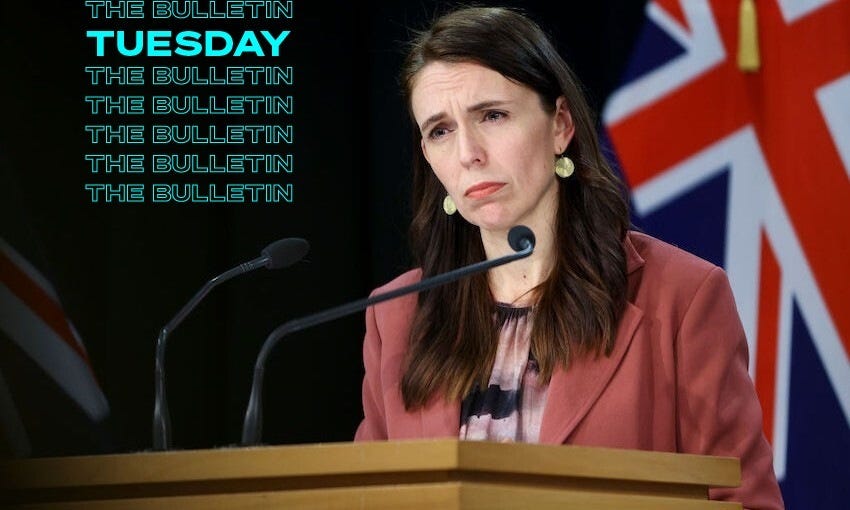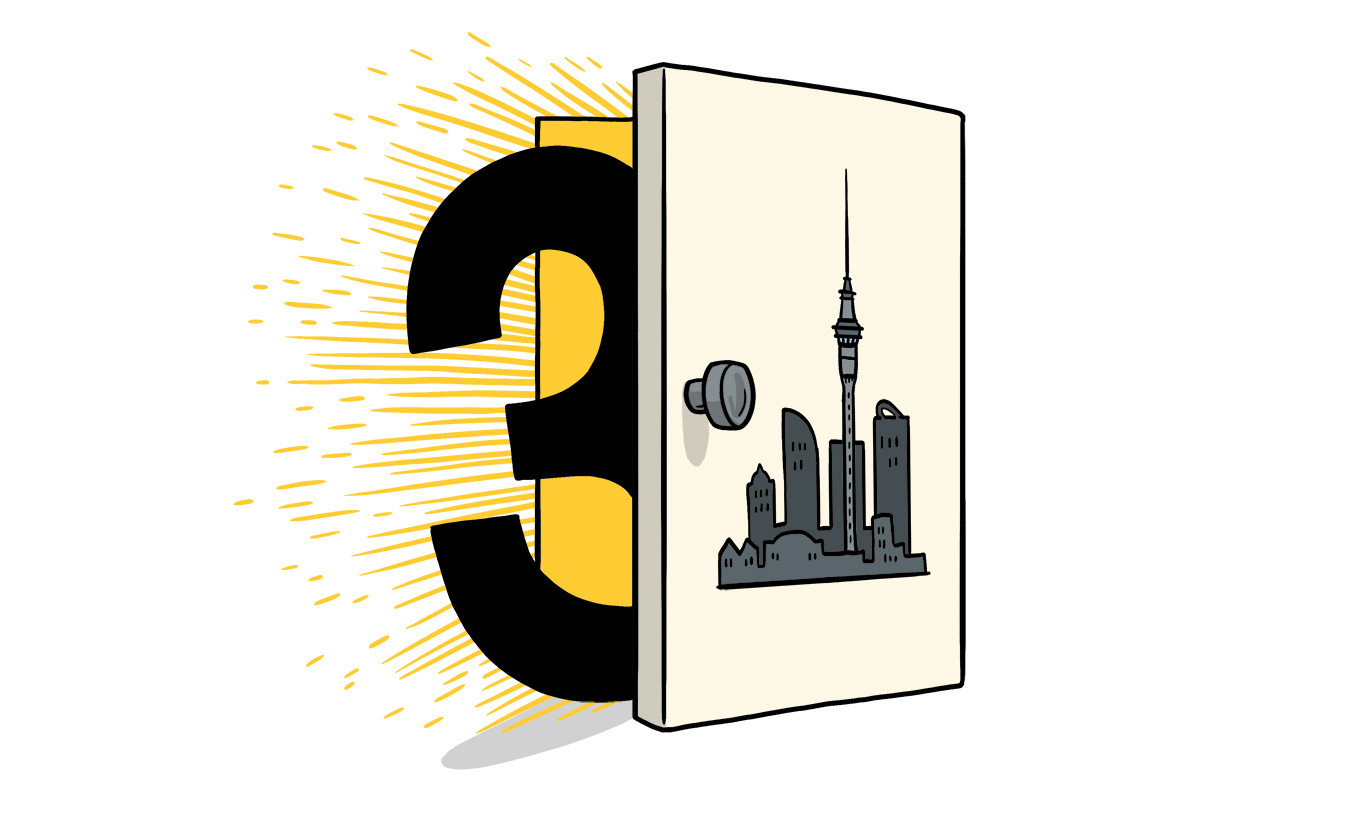'A calculated risk' as restrictions eased
Auckland’s move to level three has left some experts worried that delta could spring back to life as hundreds of thousands of people are called back to work
Mōrena and welcome to The Bulletin for Tuesday, September 21, by Justin Giovannetti. Presented in partnership with Z Energy.
In today’s edition: The first test of MIQ’s new booking system, mandatory vaccine order in court, ski fields seek wage subsidy, but first, Auckland’s move to level three.
Jacinda Ardern at parliament on August 17, 2021 (Photo by Hagen Hopkins/Getty Images)
We’ve never been here before. One of the most infectious variants of Covid-19 is still appearing unexpectedly in New Zealand’s biggest city, new cases are concentrated in areas with more vulnerable populations in South Auckland and the government is now relaxing restrictions in a move to level three. However, 4.7 million vaccine doses have been administered, providing millions with a personal layer of protection. While the country has been across the levels of restriction before and the rules have grown disagreeably familiar for most, we’ve never been in a situation like this.
The prime minister has taken a ‘calculated risk.’ That was the cautious first reaction from epidemiologist Michael Baker, who appeared on One News soon after the prime minister’s announcement yesterday that the longest level four lockdown of the pandemic is ending tonight. Many of his colleagues have adopted the phrase. A lockdown under level three will pose a tough challenge stamping out a delta outbreak that has produced over a dozen cases daily for the past fortnight. After five weeks of hard lockdown, “I think it is really in the hands of Aucklanders now,” said Baker.
The rest of New Zealand. Alert level two in the rest of the country remains, but with a tweak: gathering limits have been doubled to 100. The Auckland boundary remains and no return to level one is possible while the city remains in lockdown, the prime minister said. Asked why that applies to a Covid-free South Island, Jacinda Ardern pointed to the risks posed by two recent holidaymakers who illegally flew to Wānaka from Auckland.
The curveball in Waikato. The final hours before cabinet met were marked by growing angst over a new cluster of cases detected outside the Auckland boundary in Waikato. The small community of Mangatangi will now be under a bespoke hard lockdown lockdown for five days, according to Newsroom.
Other experts have also sounded a note of caution. While the cases didn’t alter the government’s decision, they provided a vivid example of the kind of spread that could still occur over the next two weeks as Auckland remains in level three lockdown. Public health expert Nick Wilson told the Science Media Centre that the decision was “relatively brave” from the government, “given that the outbreak is clearly not fully under control as seen with the recent spread”.
There’s no widespread undetected transmission in Auckland. While Ardern reiterated her view yesterday that it’s unwise to take any risks with the delta variant, she said health officials were no longer as concerned with Covid’s “long tail” of new cases. It’s a sign that the government’s risk settings have been readjusted. The Spinoff’s live updates covered her comments. Epidemiologists warn that the lack of widespread transmission isn’t the point, a single case in the community could be enough. That’s where this outbreak started.
Michael Plank, a modelling expert for Te Pūnaha Matatini, has said: “There is a danger that the increased number of people out in the community and the workplace at level three will add fuel to a smouldering fire and lead to an increase in cases.”
Here until Christmas? The consequences of failure in the coming fortnight could be disastrous, warns Newsroom. If cases start to rise under level three and contact tracers can't get ahead of the fast-moving virus, Auckland could stay in level three until Christmas to allow time for vaccine coverage to catch up. Politik (paywalled) has written that some of the prime minister's comments yesterday are a sign that the elimination strategy is being reinterpreted, moving towards vaccines and hard local lockdowns when needed.
Level three isn’t just level four with takeaways. One of the first things I noticed after Wellington moved to level three was the roads filling up in an industrial area near my home. The factories were fully back to work. While you can get takeaway flat whites and burgers under level three, many other businesses can open as well. According to the NZ Herald, the number of Aucklanders heading to work on Wednesday morning will triple, to 458,000. And that’s the government’s big gamble, that an infectious strain of the virus can be squashed as the country’s largest city roars back to life.
If you like what you’re reading, we need your support. The Spinoff is doing our utmost to keep you updated on Covid-19 related news. Every dollar our members contribute directly funds our editorial team and is devoted to ensuring we do more. Click here to learn how you can support the team today.
A prisoner at the centre of the Covid outbreak in Waikato appears to have breached multiple bail conditions. Newshub reports that GPS records from the man’s travel from prison to home show he stopped at private homes and a supermarket. He had to wear a tracker and was picked up from prison by three people. That seems to conflict with a judge’s order that he go straight home without unnecessary stops and with a family member. The man was allowed to travel across the Auckland boundary because his time in prison, where there was no Covid-19, was seen as the equivalent of a stint in border isolation. Health officials say he didn’t have Covid-19 when he left prison and stayed home once he got there, so he likely picked it up on his trip.
The Covid numbers: 22 new community cases were reported yesterday and 25% (6) of the previous day’s cases were active in the community while infectious. 19 of the cases were in Auckland and 3 were in Whakatīwai. 1071 cases have now been detected in the delta outbreak and 694 have recovered. 26,673 people were vaccinated on Saturday.
The Spinoff’s Covid data tracker has the latest figures.
The first test of the new MIQ booking system has left few happy. A family in Melbourne has called the system a “joke” after they were randomly put in 17,865th place in a waiting room for about 3000 spots, according to Stuff. The head of the MIQ system has called it a “technical success” after over 30,000 people entered the queue yesterday. According to the prime minister, most of the interest was in rooms around the Christmas period. While it didn’t work out for the Melbourne family, the waiting room seems a minor improvement over spending days clicking refresh on a browser.
New Zealand’s mandatory vaccine orders face a court challenge. RNZ reports a customs worker dismissed from her job for refusing the jab has gone to the High Court to argue that a vaccine order under the Covid-19 act goes beyond the expected scope of the law. While ministers and health officials were given broad powers under the act, the worker’s lawyer says the vaccine order is exceptional. The Wellington court will hear the case again today. While no announcement is expected this week, cabinet is considering introducing wider vaccine mandates in the coming months.
Lockdowns and the popping of the trans-Tasman bubble dried up guests at the southern ski fields. More than $3 million in wage subsidy claims have been made by a number of resort operators, the Otago Daily Times reports. Many ski fields were fully staffed and ready for Australians and Aucklanders to arrive only to see Covid-19 get in the way. Revenues at some resorts was down 95% to 100% at what would usually be the height of the ski season. While snow could stick around for another few weeks, travel isn’t allowed from Auckland under level three.
Ziwi pet food sells for $1.5 billion to Chinese company. Bloomberg (soft paywall) has reported that a private equity firm, FountainVest Pertners, has bought the company started nearly two decades ago by free-range deer farmer Peter Mitchell. The company sells products around the world at a premium, trading on its connection to sustainable products and that clean, green New Zealand image. It’s the second large NZ pet food company to sell to foreign buyers this year.
Got some feedback about The Bulletin, or anything in the news?
Get in touch with me at thebulletin@thespinoff.co.nz
Auckland is going into level three. (Illustration Toby Morris)
Right now on The Spinoff: Toby Manhire has a helpful primer on what level three means for Auckland this time (A bubble reminder: In most cases you can’t expand it). Joseph Nunweek is in Melbourne and writes about how tempers are fraying as the city heads towards its 250th day in lockdown. Julie Bennett explains that improving air quality is key to preventing Covid outbreaks in schools. Justin Latif reports that ending the digital divide in education will require much more work. Jihee Junn compares New Zealand's four main meal kits in a really fun yarn.
The impact of 30 years of climate inaction in New Zealand. Nearly three decades ago the country was carbon neutral, The Detail reports. Now per capita emissions have grown to more than twice the global average. In just over a month the climate change minister (with an entourage of 14 staff) will be headed to a conference in Glasgow. He would have an easier message to sell if it weren't for decades of foot dragging, but it’s unclear if any lessons have been learned. Here's an excerpt:
“You immediately think that, if we had done something stronger then or during the 90s, that first decade, we could easily be in a very different place now," she says.
Instead we are on a path where we will fail to meet our domestic targets and fulfil our international obligations to reduce our greenhouse gas emissions by 2050.
Meduna talked to scientists, business leaders and politicians, who took themselves back 30 years to the early days of climate change warnings.
Nobody said ‘no’ to an interview and no one expressed regret for the decisions they made or their attitudes to climate change.
The Silver Ferns have won over the England Roses in the first game of a series in Christchruch. RNZ reports that debutant Tiana Metuarau was a standout as the 20-year-old goal attack did not miss in the first half for New Zealand. The Roses fought back in the third quarter, aided by a shooter who scored 22 out of 23 attempts and the game was tied in the final quarter. Only a few friends and family were allowed into the arena under level two. The next game in the series is also in Christchurch tomorrow.
That's it for The Bulletin. If you want to support the work we do at The Spinoff, please check out our membership programme.







